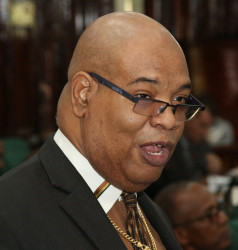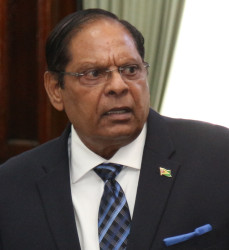The government last evening used its parliamentary majority to supress an opposition motion seeking to have all Members of the National Assembly make public their tax returns to the Guyana Revenue Authority (GRA) over the last 10 years, while arguing that such a move would violate privacy.
The motion brought by PPP/C Member of Parliament (MP) Juan Edghill originally called for the Members of the National Assembly to “make available to the public their tax returns to the Guyana Revenue Authority for the last ten years.” He further sought to have the government “expeditiously table legislation” to give effect to the motion.
However, following amendments tabled by government, the motion that was eventually passed by the National Assembly instead called for the reinforcement of the existing legal requirements to have MPs file their income tax returns and make annual declarations to the Integrity Commission.

Edghill, noting that the amendments as proposed and later passed by the government side of the House substantially change the intent and spirit of the initial motion, attempted to have it withdrawn. Opposition Chief Whip Gail Teixeira, in supporting Edghill’s position, cited precedent as established by former Speaker Ralph Ramkarran, who had ruled in December, 2006 that if an amendment changes the intent of the initial motion, it would be disallowed.
Speaker Barton Scotland, however, noted that the motion as it then stood was not the original one, since it had been amended too many times and now stood as a different motion.
However, the amended motion, when put to a vote, was eventually passed by the government side of the House.
The government’s main issue with the original motion appeared to be that it violated the Members’ expectation of privacy.

Minister of Natural Resources Raphael Trotman, who tabled the amendments that were eventually passed, noted that every member of the House, as citizens, must submit their tax returns and as MPs must make submissions to the Integrity Commission. “We are going to do so and we thank you for reminding us of both our civic duty and our duty as members of the National Assembly,” Trotman said. He, however, noted that while the PPP/C members are within their rights to make public their declarations if they wish to, they cannot require that other members give up their rights to privacy.
The minister quoted a recent Stabroek News story in which the GRA, through Chairman of its board Rawle Lucas, vowed to protect taxpayers’ data. “This is a hallowed, sacrosanct principle in tax collection and revenue matters,” Trotman declared. He added that “just two weeks ago, this House passed a bill dealing with data availability [the Credit Reporting (Amendment) Bill). The opposition cried about data falling into the wrong hands and people being exposed and what happens if data falls into the wrong hands. How is it, just two weeks after the very thing you asked us not to do, you are now asking us to do?”
‘Public confidence’
In presenting his motion, Edghill had charged the Assembly to offer the Guyanese public transparency and accountability. The motion, he declared, would “enhance public confidence in public officials” and offer all Members of Parliament a fool proof means of showing themselves innocent of all accusations of corruption.
“This is an anti-corruption mechanism that we can put in place right now,” he said. Referencing members of the house who had previously declared that their hands were clean of any corruption, Edghill challenged, “If your hand clean, open up the book and let the people of Guyana read it, let the people say our hands are clean. Let us go back 10 years, let the truth prevail where there was suspicion and objectivity where there was subjectivity.”
Conversely, he claimed that every “no” vote on the motion is “a declaration to the people of Guyana that my walk is not consistent with my talk. It says to the people, ‘I dupe you, I fool you.’ Your rhetoric must match reality.”
Prime Minister and First Vice President Moses Nagamootoo, in rising to respond to the motion, said that it was inadmissible.
According to Nagamootoo, the request for 10 years’ worth of revenue declarations exceeds the GRA requirement that tax data be kept for seven years. He further contended that certain pensions and salaries, such as those paid to former presidents, are tax-free and thus no returns relative to those earnings will exist.
Nagamootoo’s comments were interpreted by both the opposition side of the House and Speaker Scotland to be thinly-veiled references to the benefits awarded to former president and present Leader of the Opposition Bharrat Jagdeo.
This led the speaker to remind the Prime Minister that members of the house are not to be made targets of presentations from other members. This reminder, however, did very little to curb the heated exchanges that flowed between Nagamootoo and Jagdeo.
Instead, Jagdeo joined the debate by proffering two amendments to the motion. The proposed amendments resolved to have both submissions to GRA and the Integrity Commission for the last ten years be made public as well as prescribed that legal action be taken against those who have not made their submissions or have violated the laws governing such submissions.
Proving corruption
Jagdeo challenged the government side of the House to grab the opportunity to prove once and for all that the PPP/C government was as corrupt as it claimed.
“You have been claiming we are corrupt…don’t miss this opportunity to prove it,” he implored.
Having demonstrated why the government should be “interested in supporting the motion,” he went on to state why “they may not be interested in seeing it passed.”
“We heard that one of the reasons for the phenomenal salary increase for government ministers is that people came out of the private sector where they were earning large sums of money and they are expected to maintain that lifestyle. If this is true, then the nation should know and the Cabinet should know and not be misled. People may have told the Cabinet what they were earning in the past and they may have been lying. Cabinet should want to know if they have been duped,” he said.
Jagdeo then went on to note that Nagamootoo was showing his bank book to the House and when asked if he paid taxes he declared that he paid $500,000 a year.
At that point, the Speaker attempted to intervene by asking Jagdeo to confine his remarks to the matter before the House.
Jagdeo, however, declared, “Look Mr Speaker, he is doing it again. I am being provoked.” As Nagamootoo proudly displayed his bank book to the house, Jagdeo pointed out that what he has in the bank might be different from what he declares to GRA
The Speaker, however, cautioned him that “the bank book is an inanimate object and one should not be running behind an inanimate object.”
From this point, Jagdeo limited his comments to a “hypothetical member” and told the House that “if a hypothetical member is paying $500,000 a year to GRA, he is earning about $1.5M a year, which is $130,000 a month and about $4,500 a day. How could this hypothetical member claim that he was making large sums of money and is entitled to a salary that is hypothetically $1.7M a month, which is 12 times more than his actual earning in the past? And his hypothetical benefits are now 26 times more than the earnings in the past. So, combined, Mr Speaker, his hypothetical earnings now will be 40 times more than the taxable earning he declared to GRA.”
Amid the bedlam which ensued, Jagdeo declared that it is necessary to go back 10 years because baseline matters. Reminding the House of a quote used earlier by Nagamootoo, Jagdeo said that former president Cheddi Jagan may have said that the thieving starts in the second term “but how can we know that it hasn’t started in the first term of this administration? If we establish a baseline from 2016, we will have uncertainty. The year you start declaring your statement is important; you can’t have a baseline in the future.”







